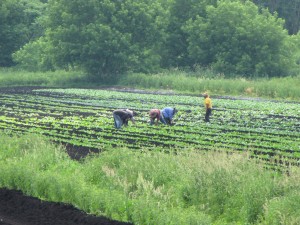
With a life predicated on the whims of nature and regulations of state and federal agencies, the potential for mandating a new-employee verification process has farmers in the Black Dirt region of Orange County seeking relief.
Farmers in Pine Island depend on migrant workers to plant crops and to harvest them at the end of the season. At present, farm workers can present documents that can”™t be challenged, farmers said after a closed-door meeting Aug. 8 with U.S. Rep. Nan Hayworth at Warwick”™s Town Hall.
“Under E-Verify, that would all change,” said retired farmer Bill Johnson, whose son now runs the family owned Fort Hill Farm in Goshen. “If E-Verify becomes a mandated program, it will decimate the farming industry.”
On May 26, the U.S. Supreme Court upheld Arizona”™s 2007 law requiring the use of E-Verify by Arizona employers, punishable by suspension or revocation of the employer”™s business license, as reported on National Council of State Legislatures website. The Immigration Reform and Control Act of 1986 (IRCA) “pre-empts any state or local law from imposing civil or criminal sanctions (other than through licensing and similar laws) upon those who employ, or recruit or refer for a fee for employment, unauthorized aliens.”
The Supreme Court by a 5-3 vote found that language in IRCA did not pre-empt the state because it was a licensing law permissible under IRCA. The E-Verify program also did not pre-empt the state, “Although Congress had made the program voluntary at the national level, it had expressed no intent to prevent States from mandating participation.” (Chamber of Commerce of United States v. Whiting, No 09-115.)
On June 14, House Judiciary Chair Lamar Smith (R-Texas) introduced Legal Workforce Act (HR2164), a bill that would make the E-Verify system mandatory for all U.S. employers.
Hayworth said she would support the legislation if agriculture were given a reprieve and another way to document farm workers could be worked out.
One farmer said he was already having problems finding laborers and had no idea how he would harvest his crop in September and October if the trend continued. “I am one worker short at the height of the season. Even though we are in the midst of terrible economic times, nobody wants these jobs ”“even though they pay above the minimum wage.” He requested his name not be used. “I don”™t want to become a government target.”
E-Verify is not the only concern farmers have in the Black Dirt region. The 12,000 acres of muck soil, famous for its onions, also produces a variety of vegetables and landscaping sod. The Wetlands Reserve Program, now available to landowners in the region, may see more land underwater and less farming as a result, Johnson said.
Under the program, the U.S. Department of Agriculture gives landowners the option to restore their property to its former wetland state ”“ if one existed previously ”“ for a period of 10 years, 30 years or in perpetuity. The Agriculture Department would pay for all or a substantial part of the restoration as well as give an incentive payment to the landowner.
Johnson said the Black Dirt region, as well as land now in use for agricultural purposes, should be exempt from the voluntary program.
“If properties in and surrounding the Black Dirt area apply and are accepted into WRP ”“ and get paid for doing it ”“ it means the farming community will be more prone to flooding because we”™d be creating more wetlands. And it will create wildlife habitats for deer and other foragers that would be a threat to crops. We have enough to contend with just getting produce from field to market.”
Onion farmer Chris Pawelski said the wetlands program “would turn much of the Black Dirt back into swampland” if landowners acted on it.” Many of the farmers are now renting their fields.
Michael Sweeton, farmer and supervisor of the town of Warwick, said the meeting with Hayworth was productive.
“Farmers brought their concerns to her and she needs to bring them back to Washington. We need a practical solution to our problems. We can”™t have a policy of producing good, cheap food and expect farmers to pay for it.”




















too bad Hayworth opposes immigration reform laws that would provide the Black Dirt farmers with a dependable supply of migrant labor.